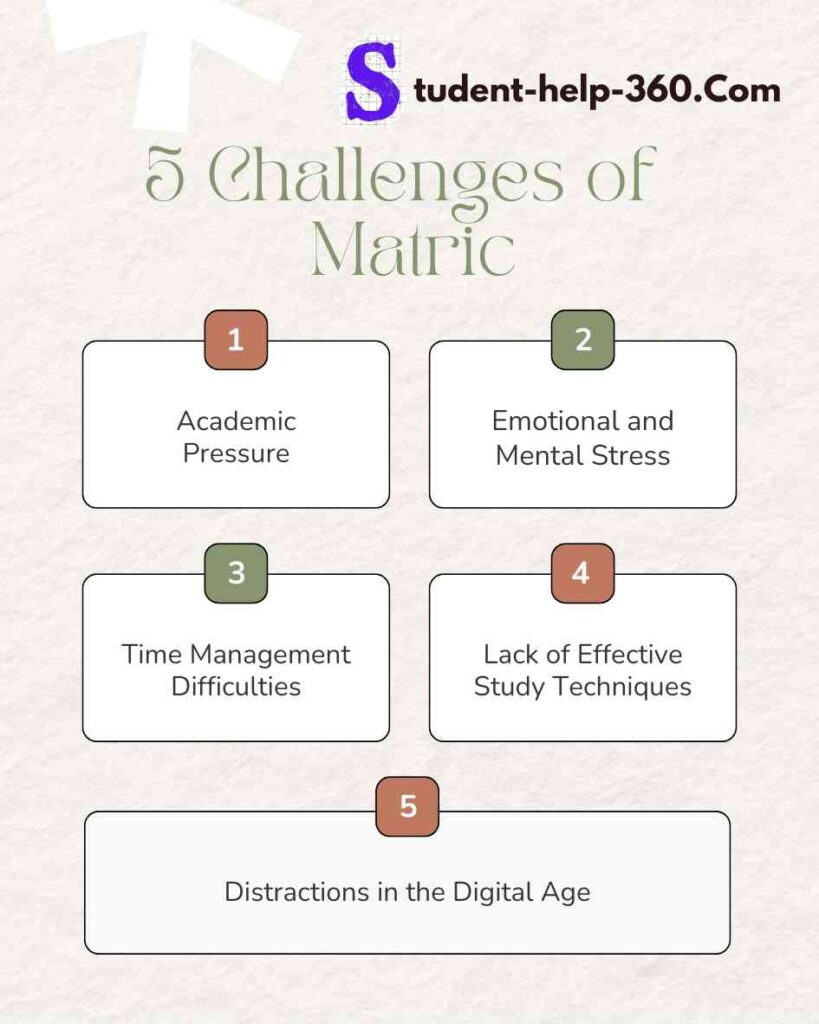Exploring the Challenges of Matric and Strategies for Success”

Table of Contents
Importance of Matric in a Student’s Life
Matric is an important year in a student’s life. It is the stage where many things come together — your academic growth, your confidence, and even your future plans. It is the year when all the learning from your earlier school years starts to make sense, paving the way for higher education and career opportunities.
if you have completed matric you can learn more study fields like ICS, ICOM and F.S.C with Detailed information
A Strong Academic Foundation
The importance of matric lies in the academic foundation it sets. Everything you study here will be useful as you move ahead in your educational journey. Matric exams require serious exam preparation. This dedication helps develop skills like time management and discipline. These skills are not just for exams but will benefit students in all parts of life.
Personal Growth and Skill Development
Matric is not just about studying books; it is also a time for personal growth during school years. Students learn about their strengths, weaknesses, and interests. This helps them make better decisions for the future. During this year, students often start career planning after matric, considering what they want to do next.
The role of matriculation in personality building is also vital. It teaches students to work under pressure, face challenges, and celebrate achievements during matric. Such experiences shape the young mind, helping it transition from adolescence into young adulthood. This is a period of significant change, and matric makes sure that students are prepared for what comes next.
Preparing for the Future
The importance of matric also lies in how it helps students prepare for the next big step in life: high school graduation and transition to higher education. The subjects you choose, the grades you get, and the skills you develop will affect your future opportunities. Whether it’s pursuing science, commerce, or arts in college, matric results play a major role.
Career opportunities post-matric are often shaped by how well a student performs. Good results lead to better options in terms of intermediate education, scholarships, and even vocational opportunities. The significance of matric is, therefore, not just academic. It has a direct link to future life goals, shaping both personal and professional paths.
Facing Challenges and Celebrating Success
Matric is a milestone year, and as with any big milestone, there are challenges faced in matriculation. Long study hours, keeping up with expectations, and managing stress are part of the journey. However, these challenges are also opportunities to grow. Each success — no matter how small — builds confidence and sets a path for future academic and personal decisions.
To sum up, matric is a turning point. It is the year that gives a student the tools to make informed choices about their future. The importance of exams in the matric year cannot be ignored, but more than that, it’s a time for learning, growing, and getting ready for the world beyond school. For every student in Pakistan, matric is not just another grade; it’s a gateway to countless possibilities.
Why Matric is Considered a Milestone Year
The matriculation year is a milestone year in a student’s life. It marks an important academic turning point where all the knowledge gained during school begins to shape the future. The significance of matric lies in its power to influence future career planning after matric and prepare students for intermediate education. Matriculation is not just about passing exams; it is about laying a solid foundation for future growth.
Building a Strong Academic Base
The matriculation year provides a strong academic base. It helps students prepare for their life goals during matric and sets a clear path for academic and personal decisions. Exam preparation in this year encourages time management and discipline, which are helpful beyond school. The importance of exams in the matric year also lies in developing problem-solving and analytical thinking.
Personal Growth and Milestone Achievements
Matric is not just about studies; it is a year of personal growth. Students learn about their strengths, weaknesses, and passions. It also guides them in career planning after matric by providing a better understanding of what they want to pursue next. The role of matric in career path cannot be ignored, as it directly affects future opportunities.
Achievements during matric shape the personality of students. Facing and overcoming challenges teaches students to handle pressure and build resilience. These skills are crucial as students transition from adolescence to young adulthood.
Preparing for Intermediate Education
The matriculation year helps students get ready for the next stage: preparation for intermediate education. The grades achieved and subjects chosen will shape the future. This is why career planning after matric is essential. Whether students want to go into science, commerce, or arts, their matric results will guide their way.
Good performance in matric opens the door to career opportunities post-matric, including scholarships and vocational courses. The cultural or societal value of matric is significant in Pakistan, as it directly impacts both educational and professional futures.
Overcoming Challenges and Moving Forward
Matric is a year filled with challenges. Students face long study hours, pressures, and expectations. These are not just challenges but also opportunities for growth. Every small success in high school milestones builds confidence and helps students prepare for further education. Facing these challenges in the matriculation year is part of growing up and is key to making informed academic and personal decisions.
The Challenges of Matric
The matriculation year can be a difficult time for students. It is not just about exams and grades; it comes with a range of challenges of matric that can feel overwhelming. These include high school struggles like academic stress, emotional pressure, managing time, and dealing with distractions. Understanding and overcoming these challenges is important for every student.
Academic Pressure
One of the biggest challenges of matric is the academic pressure. Students face high expectations from parents, teachers, and even from themselves. The extensive syllabus can often feel like too much to handle. There is also pressure to excel and get good grades, which makes students anxious.
Parental expectations and teacher pressure can add to the stress. The academic workload is heavy, and managing it requires effort and dedication. Learning how to manage this pressure is key to staying calm. Students need to develop strategies for handling academic pressure, such as studying in small portions, taking breaks, and seeking help when needed. Overcoming academic challenges helps build resilience and discipline.
Emotional and Mental Stress
The emotional stress in matric can be intense. Students often struggle with mental health challenges like peer pressure, anxiety, and fear of failure. The thought of not doing well can create self-doubt among teens. The emotional impact of exams can lead to sleepless nights, nervousness, and difficulty in concentrating.
To manage this emotional stress, it is important to talk about these feelings. Finding emotional support from family, friends, or teachers can make a big difference. Addressing mental health concerns in students is crucial during this year. It is also helpful to practice relaxation techniques, like deep breathing or meditation, to stay calm during this challenging time.
Time Management Difficulties
Another common challenge of matric is time management. There are so many subjects to study, and students often end up procrastinating. Poor time management habits make it difficult to complete tasks on time, leading to more stress.
Creating a study schedule can help manage time better. Students should also learn to balance school and extracurriculars. Effective time planning for matric means setting realistic goals, taking regular breaks, and avoiding distractions. Overcoming procrastination in students can lead to more productivity and less stress.
Lack of Effective Study Techniques
Many students struggle because they do not know effective study techniques. Often, students rely on rote learning, which does not work well for understanding complex topics. This can lead to difficulties in grasping key ideas and makes studying harder.
Using effective learning methods like active recall, making notes, and group study can help improve understanding. Developing good study habits for matric can make a huge difference. Students should explore different strategies for active learning, such as visual aids or explaining topics to someone else. Good study techniques are important to succeed in matric and to reduce stress.
Distractions in the Digital Age
In today’s world, digital distractions are everywhere. Social media and online games are a constant source of distraction for students. These distractions reduce focus and make it hard to concentrate on studies.
The impact of smartphones on learning is a major issue for students. It leads to poor concentration habits and can result in less productive study time. To avoid these distractions, students can practice digital detox strategies. Setting a time limit for using mobile phones and keeping them away during study time can help in improving focus.
Coping Mechanisms for Matric Challenges
Facing all these matriculation challenges can feel overwhelming, but there are many ways to cope. Students can practice stress management in matric by engaging in physical activities, talking about their feelings, and taking breaks. It is also important for students to have a support system to share their thoughts and fears.
Adapting to high academic demands is part of growing up. Learning to manage stress, finding effective study techniques, and reducing distractions can help students face the challenges of matric with confidence. The skills learned during matric, like time management for high schoolers, will be valuable for the rest of their lives.
Smart Ways to Pass Matric
Passing matric successfully is an important goal for students in Pakistan. It is the key to future academic growth and opens doors to career opportunities. In this article, we will look at some smart ways to pass matric. We will talk about different study strategies for matric, effective planning, and tips that can help you succeed. Let’s get started!
Developing an Effective Study Plan
An effective study plan for matric is the first step to success. It means setting clear goals and creating a timetable for exams. Your timetable should include study time for each subject and should focus on prioritizing study topics. Make sure to give more time to difficult subjects or topics that need extra attention.
Creating a revision schedule is also very important. This is where you plan your goal-based study strategies. Divide the topics into small parts, and review them regularly. This helps to keep everything fresh in your mind. Organizing study schedules and balancing revision and practice is the best way to be ready for exams. With a proper study plan, you can manage your time well and make sure every subject gets enough attention.
Utilizing Study Resources
To pass matric successfully, using different study resources for matric is very helpful. Textbooks are important, but you can also learn a lot from online learning platforms. They have digital tutorials and guides that explain topics in a fun and simple way.
Another helpful way is to study with friends. Group study benefits include sharing ideas and helping each other understand difficult topics. Peer-assisted learning can make learning enjoyable. You can also learn from recommended textbooks, as well as online study tools and tutorials. Using collaborative learning methods and exploring best guides for exam preparation can give you a strong advantage in the exams.
Practicing Past Papers and Mock Tests
Past papers for matric are one of the best ways to prepare for exams. They help you understand the exam pattern and type of questions that usually come. It is important to solve mock tests regularly. Practice tests for exam confidence are useful as they help in getting used to the exam environment.
You also learn about time management through mock exams. Solving previous year’s papers helps you understand the kinds of questions and how to answer them. This practice helps in reducing mistakes and increases confidence during the real exam. It is a great way to understand exam trends and make sure you are well-prepared.
Mastering Time Management
Time management for students is very important during the matric year. Making the best use of your time can help you achieve your goals. Avoid procrastination by setting daily and weekly study targets. This keeps you on track and makes sure that all subjects get proper attention.
Study goal-setting is the key to staying organized and productive. Create small and achievable goals for every day. This makes studying less overwhelming. Overcoming time management issues is possible with effective scheduling techniques and focusing on one goal at a time. It is also important to make time for breaks. Short breaks can improve focus and help you study better.
Focusing on Mental Health and Well-Being
Mental health during exams is just as important as studying. Too much stress can make it hard to focus and remember things. It is important to use stress management techniques like taking deep breaths, doing meditation, or just talking to family and friends.
Student well-being tips include getting enough sleep, eating healthy food, and exercising. Physical activity can help in reducing stress and keeping your mind sharp. The importance of sleep for students cannot be ignored. Good sleep helps in better memory and concentration. Taking care of your emotional support during exams is also important. When you feel supported by your family and friends, you are more likely to stay motivated.
Effective Note-Taking and Revision Techniques
Effective note-taking is key to understanding and remembering what you learn. Taking notes helps you remember important points and makes revision easier. Use note-taking tips like highlighting key points, summarizing topics, and writing in your own words.
There are also many revision techniques that can help you prepare well. Flashcards for studying are useful for memorizing important terms. Mind mapping is another method that helps in connecting different ideas. It also helps in understanding the overall concept. Revising with concise notes preparation saves time and ensures that you remember the main points without feeling overwhelmed.
Exam Day Strategies
On exam day, being prepared is key. Exam day tips include getting enough sleep the night before, having a healthy breakfast, and being calm. Staying calm during exams helps you think clearly and answer questions properly.
Tackling difficult questions requires patience. If you do not know the answer right away, do not panic. Move on to the next question and come back later. Managing your time during the exam is also important. Divide the time for each section and make sure you do not spend too much time on one question. Having confidence-boosting techniques like taking deep breaths and believing in yourself can also help improve performance.
Time management is essential, as is focusing on your mental health. Study hard but do not forget to take care of your mind and body. Remember, matric is a milestone in your life. It is a year to learn, grow, and take a big step towards your future. Stay positive, be consistent, and use these smart strategies to succeed.
The Role of Parents and Teachers in Matric Success
The role of parents in matric success and the role of teachers in matric success are very important. Parents and teachers work as a team to provide parental and teacher support for students. When they work together, students feel supported and can do their best. Let’s look at how both parents and teachers help students succeed in matric.
Encouraging a Positive Learning Environment
A positive learning environment is essential for matric success. Emotional support for students from both parents and teachers can make a big difference. It helps students stay motivated and focused. Motivation for academic success often comes from having a good environment to study and learn in.
Parents should avoid putting too much pressure on grades. Instead, they should focus on encouraging learning over performance. This helps create a stress-free study atmosphere where students feel safe to make mistakes and learn. When students are motivated without fear, they learn better. Balancing academic expectations and emotional well-being is key to success in matric.
Guiding Study Habits
Guiding study habits is another important role of parents and teachers. Focused study routines help students make the best use of their time. Parents can help by monitoring study routines and providing a quiet place to study. Teachers can offer constructive feedback for students to help them improve.
Teacher involvement in study plans is also helpful. Teachers can guide students on what to focus on and how to manage their time. This kind of support encourages consistent study routines and helps students stay disciplined. A structured guidance in matric helps students develop strong study habits, which leads to better results.
Recognizing Warning Signs of Burnout
Recognizing burnout in students is very important for parents and teachers. Too much studying without breaks can lead to burnout. Stress management strategies should be used to keep students healthy and focused. Parents and teachers should watch for signs of anxiety like changes in behavior or mood.
Early intervention for stress can prevent burnout. Offering support systems for mental health like talking to students or getting help from counselors can make a big difference. Preventing student burnout is about balancing study time and rest. Emotional balance in matric helps students stay focused and do their best without feeling overwhelmed.
Inspiring Success Stories of Matric Students
Many students face difficulties during matric, but some stories inspire us all. These inspiring matric success stories are about students who never gave up. They worked hard, showed academic perseverance, and achieved great things. Here, we share real stories of students from Pakistan who faced challenges but still succeeded. These stories are full of motivational student journeys and will help you believe in your own success.
Real-Life Examples of Students Who Overcame Challenges
Overcoming matric challenges is not easy, but many students have done it. One student, Ali, struggled with math. It was his weakest subject. Ali felt nervous before every exam. But, he did not give up. He practiced every day, asked teachers for help, and used extra study materials. His hard work paid off when he scored well in his matric exams. This real-life student success story shows that with effort, anything is possible.
Another student, Ayesha, had health issues during her matric year. She missed many classes. But she stayed determined. She made a study plan, used online tutorials, and received support from her teachers and family. Ayesha not only passed but got excellent grades. Her inspirational journey teaches us that personal struggles in matric can be overcome with dedication and support.
Lessons Learned From Their Journeys
These stories offer important lessons from student success. Ali and Ayesha’s stories show that key takeaways from matric journeys include staying focused, practicing regularly, and seeking help when needed. Learning from challenges helps students grow stronger.
One major lesson for future students is the importance of persistence. Success does not come without effort. It is important to set goals and work towards them every day. The strategies for success in matric that worked for Ali and Ayesha can work for you too. Believe in yourself, do not be afraid to ask for help, and stay positive.
The life lessons from matric success show us that no challenge is too big if you are determined. These stories are a reminder that success is possible with hard work and determination. Let these inspiring students motivate you to keep moving forward, no matter what challenges you face.
Common Mistakes to Avoid During Matric
Matric is an important year, and avoiding common mistakes can make a big difference. Many students make common mistakes in matric without even realizing it. These matric pitfalls can affect their final results. Let’s look at some of the mistakes during matric exams and how to avoid them for a successful outcome.
Overloading Yourself with Unrealistic Expectations
One of the biggest unrealistic expectations in matric is trying to do too much at once. Students often set high expectations without considering their capabilities. This leads to academic overloading mistakes and stress. Pressure to perform in matric exams can make students tired and unhappy. It is important to set realistic academic goals that match your abilities.
Coping with high academic expectations means balancing studies and relaxation. Instead of trying to be perfect in everything, focus on what you can achieve. This helps in managing pressure and performing better. Always remember that doing your best is more important than overburdening yourself.
Ignoring Self-Care and Burning Out
Ignoring self-care in matric can lead to burnout. Many students forget to take care of themselves while studying for exams. Student burnout during exams affects performance and leads to poor health. Neglecting mental health in matric is a big mistake.
Self-care in academics is important for success. Take short breaks, eat healthy, and sleep well. These small actions help in maintaining focus and energy. Preventing exhaustion in matric students is possible when you pay attention to your health. Strategies for avoiding burnout in matric include regular rest, talking to friends, and managing study time wisely.
Neglecting to Practice Past Papers
Not practicing past papers is a common matric preparation mistake. Past papers are very helpful for understanding the exam pattern and types of questions. Many students overlook this and end up struggling during exams.
Importance of solving past papers cannot be ignored. It helps in managing time and reduces anxiety during the actual exam. Benefits of practicing previous papers include better familiarity with questions and increased confidence. Enhancing performance through practice is one of the best strategies to succeed in matric. Make sure to include past papers in your study plan.
Summary
To avoid common mistakes in matric, focus on setting realistic goals, take care of your health, and practice past papers. Avoiding these matric pitfalls can make your journey smoother and more successful. Remember, success in matric comes from smart planning and taking care of yourself.


